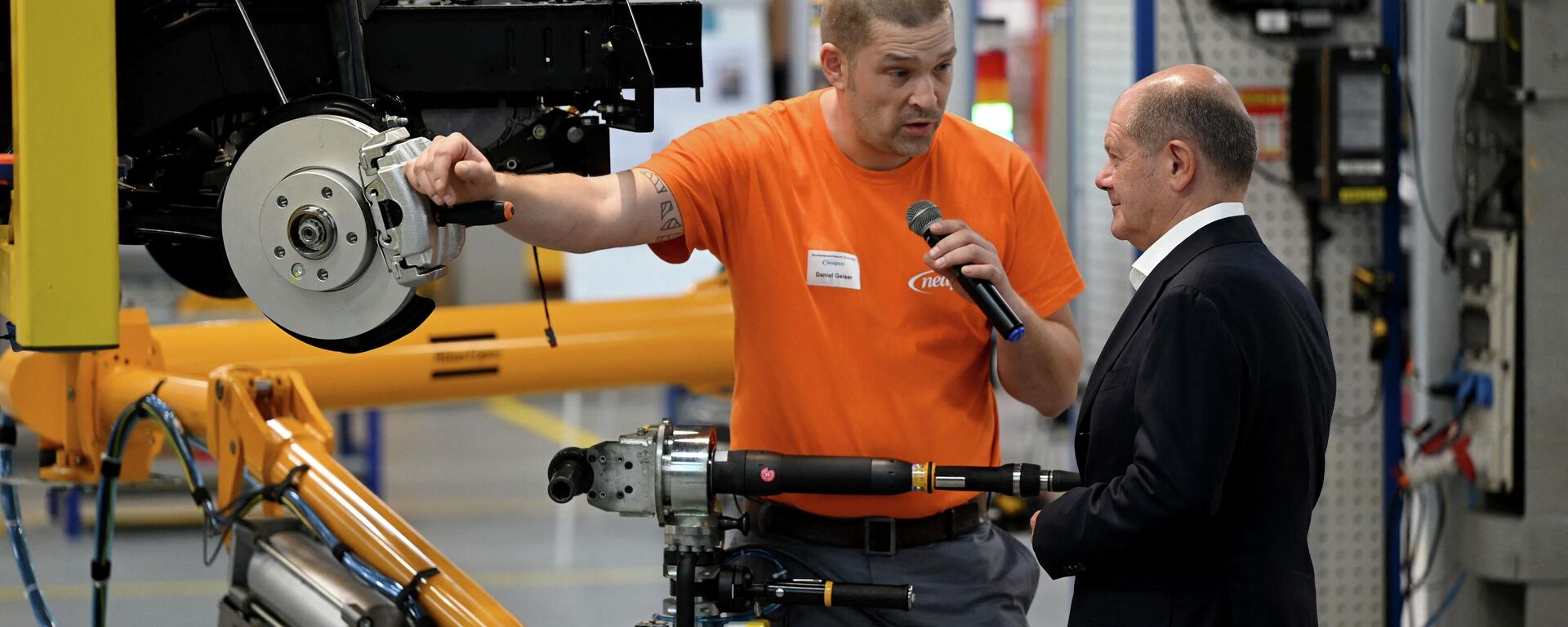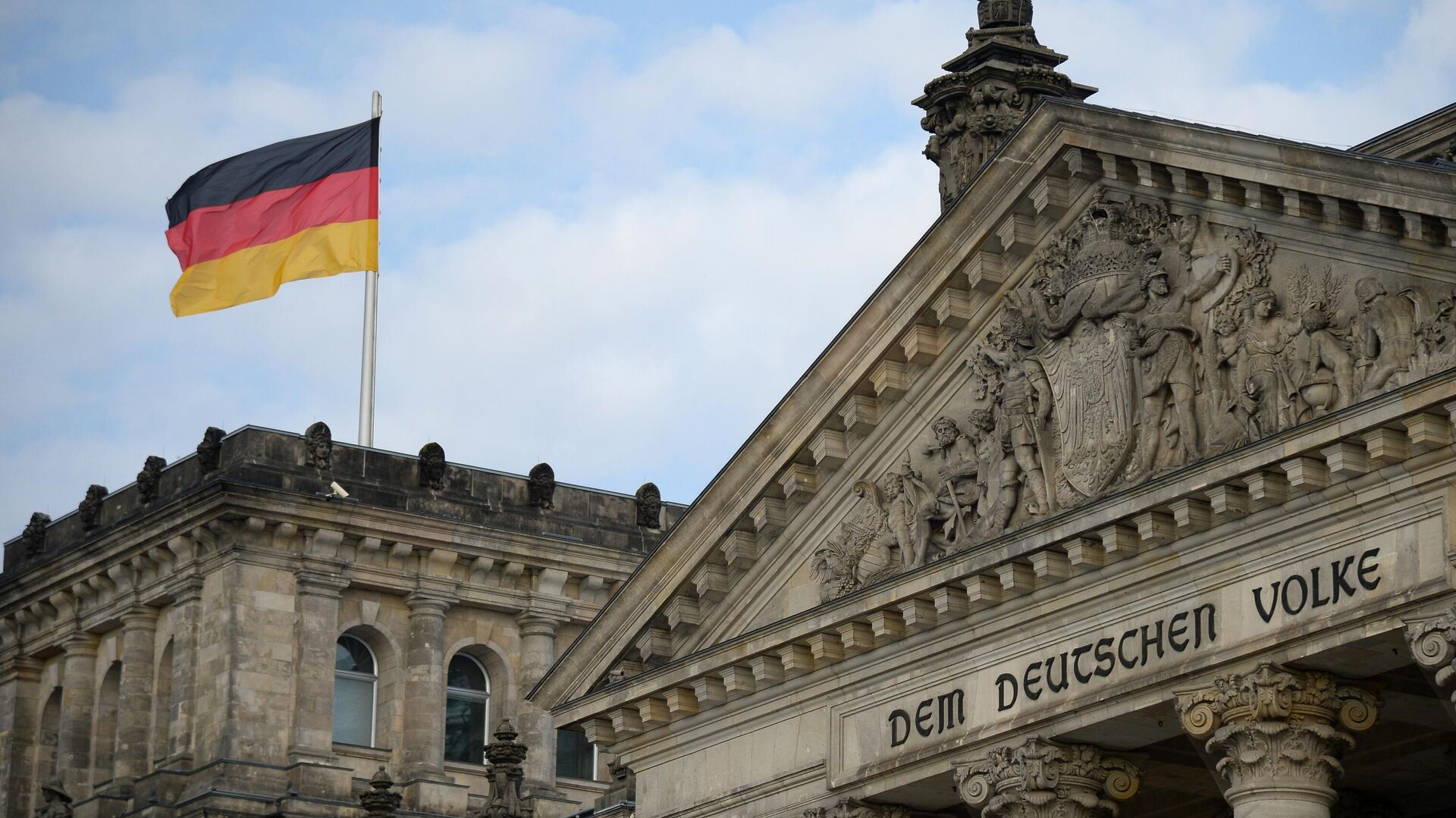https://sputnikglobe.com/20231115/germanys-energy-woes-spark-deindustralization-on-considerable-scale-1114980581.html
Germany's Energy Woes Spark 'Deindustrialization on Considerable Scale'
Germany's Energy Woes Spark 'Deindustrialization on Considerable Scale'
Sputnik International
Germany's automotive, mechanical engineering, and industrial goods companies prioritize moving less complex processes overseas to secure their business futures. Berlin's chances of reversing such a trend are in doubt, as companies express disappointment in the current government's actions to forestall their departure.
2023-11-15T17:34+0000
2023-11-15T17:34+0000
2023-11-15T18:42+0000
economy
deloitte
european union (eu)
berlin
china
germany
business
europe
newsfeed
olaf scholz
https://cdn1.img.sputnikglobe.com/img/07e7/08/18/1112856658_0:171:3035:1878_1920x0_80_0_0_10efb046d586ce0da75687c5dc89dfc7.jpg
Consultancy firm Deloitte reports that two out of three German companies have partially relocated their operations abroad due to ongoing energy issues in Germany.Previous reports indicated that nearly half of the country’s small-to-midsized companies were considering moving abroad or ceasing operations. According to Deloitte, 67 percent of German companies have moved some operations abroad, and every third industrial company plans to relocate high-quality areas such as production and preassembly.Investments in infrastructure, digitalization, and cost-effective energy pricing are essential for securing business locations. The situation is particularly acute in Germany’s mechanical engineering, industrial goods, and automotive sectors, where 69 percent of companies report moderate to large-scale relocation.Currently, companies are primarily moving less complex aspects like component manufacturing abroad. Florian Ploner, a partner at Deloitte and industry sector expert, remarked, "Deindustrialization is already taking place on a considerable scale here. If the general conditions remain the same, it is very likely that more companies will follow and more and more important parts of the value creation will migrate."When considering relocation, one-third of respondents focus on high-value areas like general production (33 percent) and preassembly (34 percent). Currently, companies are relocating evenly across the EU, Asia, and the US, with only 10 percent of companies planning to move to other Asian countries and eight percent considering returning to Europe from Asia.Germany's prospects for reversing this trend seem slim. Companies suggest that increased subsidies and reduced bureaucracy might encourage them to stay, but they have little faith in the current government's actions to prevent their departure. While this trend concerns Berlin, it offers some positives for Brussels, as companies plan to move their manufacturing processes within the European Union.From the companies' perspective, reducing bureaucracy and ensuring competitive energy prices are practical measures to enhance location attractiveness, with 69 percent in favor. In contrast, state support for key technologies (45 percent) or simplified immigration of qualified specialists (43 percent) are less critical.Dr. Jurgen Sandau, a Deloitte partner and supply chain expert, notes that, "The pressure on companies is enormous....Nevertheless, a hasty move rarely makes sense. Companies in this country are well advised to make their capacities flexible over the next five years with the help of platforms and networks. After all, factors such as legal certainty and stability in Germany as a business location are essential for entrepreneurial success."Companies not currently relocating are focusing on alternative suppliers and expanding multisourcing. They rely on comprehensive supplier management, collaboration, cross-supply chain data exchange, and risk analyses.Meanwhile, it should be recalled that the government led by Olaf Scholz, in coordination with the EU and the US, has imposed sanctions on Russia since 2022 due to the ongoing conflict in Ukraine. This action prompted the German government to cease purchasing Russian energy, which had been the bedrock of its industrial boom. The sanctions also exacerbated the fuel crisis worldwide, with Europe becoming its primary victim.The situation further deteriorated after the sabotage of the Nord Stream pipeline system, built to provide gas from Russia to Europe, allowing German industry to use cheap energy.In addition, the future of European industrial companies even more bleak considering the US course towards protectionism. The US Inflation Reduction Act, which provides massive subsidies to US businesses in a bid to concentrate manufacturing sites in North America, caused major concerns in the EU, with French President Emmanuel Macron saying it may lead to the deindustrialization of Europe.
https://sputnikglobe.com/20230825/german-business-confidence-plummets-as-recession-deindustrialization-pummel-economy-1112881899.html
berlin
china
germany
brussels
Sputnik International
feedback@sputniknews.com
+74956456601
MIA „Rossiya Segodnya“
2023
Chimauchem Nwosu
https://cdn1.img.sputnikglobe.com/img/07e7/09/01/1113046371_0:99:1536:1635_100x100_80_0_0_9c5c627283eca931c39fe4852bbb301c.jpg
Chimauchem Nwosu
https://cdn1.img.sputnikglobe.com/img/07e7/09/01/1113046371_0:99:1536:1635_100x100_80_0_0_9c5c627283eca931c39fe4852bbb301c.jpg
News
en_EN
Sputnik International
feedback@sputniknews.com
+74956456601
MIA „Rossiya Segodnya“
Sputnik International
feedback@sputniknews.com
+74956456601
MIA „Rossiya Segodnya“
Chimauchem Nwosu
https://cdn1.img.sputnikglobe.com/img/07e7/09/01/1113046371_0:99:1536:1635_100x100_80_0_0_9c5c627283eca931c39fe4852bbb301c.jpg
deloitte, german companies, german companies' relocation, germany's energy crisis, germany's industrial sector, germany's automotive industry, mechanical engineering, germany's deindustrialization, production relocation, competitive energy prices, digitalization, infrastructure investments, supply chain management, multisourcing strategies, business relocation trends.
deloitte, german companies, german companies' relocation, germany's energy crisis, germany's industrial sector, germany's automotive industry, mechanical engineering, germany's deindustrialization, production relocation, competitive energy prices, digitalization, infrastructure investments, supply chain management, multisourcing strategies, business relocation trends.
Germany's Energy Woes Spark 'Deindustrialization on Considerable Scale'
17:34 GMT 15.11.2023 (Updated: 18:42 GMT 15.11.2023) Germany's automotive, mechanical engineering, and industrial goods companies are prioritizing moving less complex processes overseas to secure their business futures. Berlin's chances of reversing such a trend are in doubt, as companies have expressed disappointment in the current government's actions to forestall their departure.
Consultancy firm Deloitte reports that two out of three German companies have partially relocated their operations abroad due to ongoing energy issues in Germany.
Previous reports indicated that nearly half of the country’s small-to-midsized companies were considering moving abroad or
ceasing operations. According to Deloitte,
67 percent of German companies have moved some operations abroad, and every third industrial company plans to relocate high-quality areas such as production and preassembly.
Investments in infrastructure, digitalization, and cost-effective energy pricing are essential for securing business locations. The situation is particularly acute in Germany’s mechanical engineering, industrial goods, and
automotive sectors, where 69 percent of companies report moderate to large-scale relocation.

25 August 2023, 12:02 GMT
Currently, companies are primarily moving less complex aspects like component manufacturing abroad. Florian Ploner, a partner at Deloitte and industry sector expert, remarked, "Deindustrialization is already taking place on a considerable scale here. If the general conditions remain the same, it is very likely that more companies will follow and more and more important parts of the value creation will migrate."
When considering relocation, one-third of respondents focus on high-value areas like general production (33 percent) and preassembly (34 percent). Currently, companies are relocating evenly across the EU, Asia, and the US, with only 10 percent of companies planning to move to other Asian countries and eight percent considering returning to Europe from Asia.
Germany's prospects for reversing this trend seem slim. Companies suggest that increased subsidies and reduced bureaucracy might encourage them to stay, but they have
little faith in the current government's actions to prevent their departure. While this trend concerns Berlin, it offers some positives for Brussels, as companies plan to move their manufacturing processes within the European Union.
From the companies' perspective, reducing bureaucracy and
ensuring competitive energy prices are practical measures to enhance
location attractiveness, with 69 percent in favor. In contrast, state support for key technologies (45 percent) or simplified immigration of qualified specialists (43 percent) are less critical.
Dr. Jurgen Sandau, a Deloitte partner and supply chain expert, notes that, "The pressure on companies is enormous....Nevertheless, a hasty move rarely makes sense. Companies in this country are well advised to make their capacities flexible over the next five years with the help of platforms and networks. After all, factors such as legal certainty and stability in Germany as a business location are essential for entrepreneurial success."
Companies not currently relocating are focusing on alternative suppliers and expanding multisourcing. They rely on comprehensive supplier management, collaboration, cross-supply chain data exchange, and risk analyses.
Meanwhile, it should be recalled that the government led by Olaf Scholz, in coordination with the EU and the US, has imposed sanctions on Russia since 2022 due to the ongoing conflict in Ukraine. This action prompted the German government to cease purchasing Russian energy, which had been the bedrock of its industrial boom. The sanctions also exacerbated the fuel crisis worldwide, with Europe becoming its primary victim.
The situation further deteriorated after the sabotage of the Nord Stream pipeline system, built to provide gas from Russia to Europe, allowing German industry to use cheap energy.
In addition, the future of European industrial companies even more bleak considering the US course towards protectionism. The
US Inflation Reduction Act, which provides massive subsidies to US businesses in a bid to concentrate manufacturing sites in North America, caused major concerns in the EU, with
French President Emmanuel Macron saying it may lead to the
deindustrialization of Europe.



